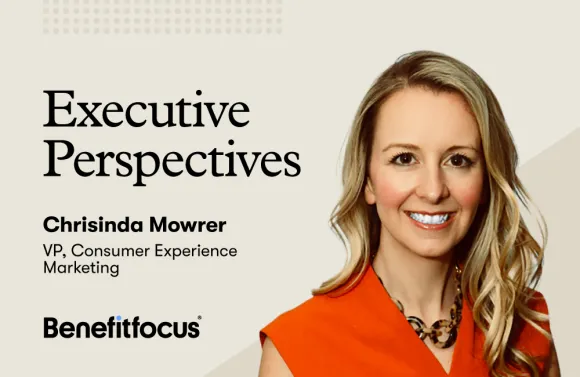
In this edition of Executive Perspectives, Gaby Marroig, VP, Client Relationship Management, shares her thoughts on providing service excellence to clients, simplifying benefits for employees and partnering with consultants and brokers to achieve successful outcomes for mutual end clients.
Q: Considering the macro trends impacting employers and health plans, where do you think the benefits industry is heading within the next five years?
A: There is a continued focus on consolidation and efficiency in the industry. There is pressure on those that we serve to do more with less and to further leverage automation and technology. We’re all on a really curious and interesting journey, as many of the new capabilities in front of us are still immature. Collectively, we’re still learning exactly how to apply them in our businesses – there's more testing, iterating and imagining to do.
In addition, benefits continue to be such an important piece of the retention and attraction package. Employees continue to be confused and ask questions like, “Do these benefits actually make sense for me and my family? Do I understand the meaning and the value of what they can provide? Have I picked the right benefits? Am I overinsured or underinsured? What is this going to cost me?” Everything is going up and this is creating a dynamic where employees could want to spend less not only on their household, but also for their benefits.
There's also a growing desire for personalization. While point solutions can be directed at very specific offerings or ailments, we in the benefits industry still have some work to do to educate and inform on a very personal level.
Q: In your opinion, what issues are keeping benefit leaders up at night?
A: Benefits are expensive, and everyone has been asked to do more with less. There is a big cost element to the work that we do. Medical costs keep going up and employers must contend with that while also contending with whether their benefits meet the needs of their population. On top of this, the compliance landscape is complex. Benefits leaders are trying to navigate these complexities and come up with solutions and offerings for their employees that make sense.
Another issue is the fact that we’re serving a multigenerational workforce right now. There are five generations in the workplace, and they all have their own set of needs. Some interesting things are coming to light with Gen Z and their expectations – for instance, work/life balance is the most important thing they look for when choosing an employer – and benefit leaders are left wondering how to navigate that while managing a budget.
Cost elements, compliance elements and striving to service your employees effectively across all the generations — all of these things are likely keeping benefits leaders up at night.
Q: What does service excellence in benefits administration mean to you?
A: In this industry – and maybe every service-oriented industry! – we live and die by expectations. How effectively you set and manage those expectations is one of the keys to delivering service excellence. I've always lived with my personal credo. I call it Gaby’s 3 Ps: being proactive, being predictable and being a partner. Those three things are not only what I expect of myself but also what I expect from my teams. And they've never done me wrong. Sticking to these principles has always worked.
To be in the service excellence business, you also have to have the spirit of service. You must innately want to help people. You need to have a sense of organization and curiosity. We manage a lot for our clients, and they expect us to do it effectively. We strive to provide value while building a trusted advisor relationship; to become indispensable to the client because they trust us and have confidence in us. That’s something we earn — and that’s service excellence.
"I've always lived with my personal credo. I call it Gaby’s 3 Ps: being proactive, being predictable and being a partner...and they've never done me wrong."
Q: What should benefits advisors expect from Benefitfocus in regard to service excellence?
A: Our clients work with various stakeholders, including insurers and brokers, and we take these relationships seriously. These relationships are important to the client and therefore important to us. As a responsible service provider, we strive to foster a transparent, collaborative and consultative alignment with all who serve our mutual client.
Q: Is providing strategic benefits support part of a winning service model?
A: Service Excellence is continuing to evolve to expect more strategic support. Support in defining ways in which we can identify, understand and deliver on client’s overarching needs and near- and long-term goals.
Having built trust and confidence with clients – and having earned the right to have those strategic discussions about long term vision and goal planning – really sets you apart and puts you at a different level around service excellence. In summary, yes, providing strategic support is part of a winning service model.
Q: How can employers best demonstrate the value of their benefits programs?
A: Simplicity. Make it simple for employees to access the care they need when they need it.
Our landscape is complex for a lot of different reasons. Sometimes it’s challenging to figure out what provider to go to, whether they are in-network, what’s the deductible and so on. You want the experience to have no friction for employees to figure out what they need to do. And you also want them to feel good about work — that their performance is being rewarded with this great benefits package that they actually know how to use.
It’s tough to navigate the health ecosystem so let’s just make it easier for employees. Life is complicated enough. Health insurance protects people when they need it. If we make it hard for them to figure out how to get the care they need, none of us is winning this battle.
Q: Many clients point to Benefitfocus’ people and those personal relationships as a huge reason for their success. How does that set an experience apart for clients?
A: There's a line we use on my side of the house, in client management. We say it’s imperative that clients feel like we're a part of their team. We want them to know they can count on us to deliver but also count on us to stop them from possibly making the wrong decision. We want them to know they can trust us. It’s as if we're sitting at the virtual desk next to them and we understand each other and can finish each other’s sentences. That way, we are one team – and we've all won.


